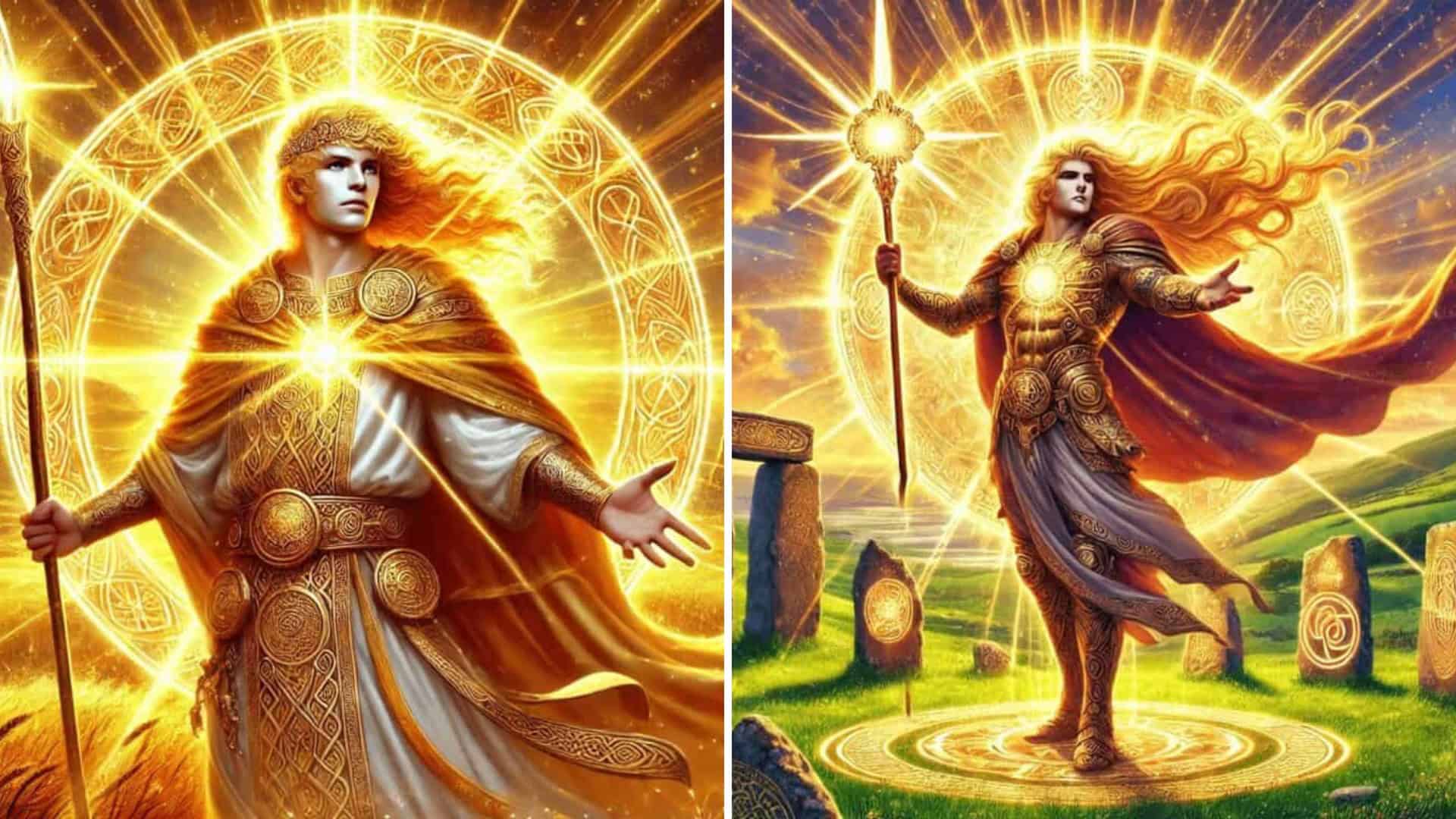No products in the cart.

Lugh, a central figure in Irish mythology, is renowned as a god of many talents. Known as Lugh Lámhfhada (“Lugh of the Long Arm”) for his skill with a spear, he is celebrated as a master of the arts, crafts, and warfare. Often associated with the sun and illumination, Lugh’s influence spans a diverse range of domains, making him one of the most revered deities of the Celtic pantheon. His legacy is immortalized in myths such as the Second Battle of Moytura and in modern traditions like the harvest festival of Lughnasadh.

Lugh is a multifaceted god whose attributes and achievements have earned him the title Samildánach, meaning “Master of All Arts” or “Equally Skilled in Many Trades.” His name is thought to derive from the Proto-Indo-European root *leuk-, meaning “light” or “brightness,” underscoring his association with the sun and illumination. Lugh is a member of the Tuatha Dé Danann, the mythical race of divine beings who settled in Ireland, and his diverse abilities make him a key figure in Celtic mythology.
As a god of versatility, Lugh’s expertise encompasses numerous domains. He is a skilled warrior, a gifted craftsman, and a patron of the arts. His presence in myth often highlights his ability to bring innovation, strategy, and inspiration to the forefront, whether in times of conflict or creation. His role as a sun god connects him to themes of vitality, growth, and renewal, reinforcing his position as a deity who bridges the realms of light and knowledge.
One of the most famous tales involving Lugh is the Second Battle of Moytura, a pivotal event in Irish mythology that highlights his strategic brilliance and martial prowess. In this epic conflict, the Tuatha Dé Danann face the oppressive Fomorians, a race of monstrous beings led by Balor, a fearsome giant with a deadly eye.
Lugh’s entry into the tale is marked by his rejection at the gates of Tara, the seat of the Tuatha Dé Danann, where he seeks entry. He is initially denied because the gods believe they have no need for another member. However, Lugh cleverly asserts his worth by demonstrating his mastery of multiple disciplines, including blacksmithing, poetry, magic, and warfare. His versatility earns him a place among the gods, setting the stage for his pivotal role in the battle.
During the Second Battle of Moytura, Lugh’s leadership and tactical acumen prove instrumental in rallying the Tuatha Dé Danann against the Fomorians. In the climactic moment of the battle, Lugh confronts his grandfather, Balor. Using his sling or spear—accounts vary—Lugh strikes Balor’s poisonous eye, killing him and turning the tide of the conflict. This victory not only secures freedom for the Tuatha Dé Danann but also establishes Lugh as a saviour figure in Celtic mythology.

One of Lugh’s most iconic attributes is his spear, known as Gáe Assail or the “Spear of Assal.” This weapon is said to be unstoppable, capable of defeating any foe, and often requires careful containment due to its immense power. The spear symbolizes Lugh’s martial prowess, precision, and the focused application of his many talents.
Lugh’s connection to the sun reinforces his role as a bringer of light, both literal and metaphorical. As a solar deity, he embodies illumination, growth, and the cyclical nature of life. This association makes him a patron of agriculture and sustenance, tying him to the natural rhythms of the earth.
Lugh’s title as Samildánach underscores his mastery of diverse disciplines, from craftsmanship and healing to poetry and magic. This versatility is a defining trait, illustrating his ability to adapt, innovate, and lead across various domains.
Lugh’s influence extends beyond mythology into the realm of tradition and celebration. The festival of Lughnasadh, named in his honour, marks the beginning of the harvest season. Celebrated on August 1st, this ancient festival reflects themes of gratitude, community, and renewal.
The festival is said to have been established by Lugh in memory of his foster mother, Tailtiu, who cleared the plains of Ireland for agriculture and died from her labours. In her honour, Lugh decreed that games, feasts, and communal gatherings would be held to celebrate the bounty of the harvest.
Lughnasadh was traditionally observed with athletic competitions, storytelling, and rituals to ensure a successful harvest. Offerings of grain, fruit, and other produce were made to honour Lugh and the land. These customs highlight Lugh’s dual role as a god of sustenance and a figure of community cohesion.

Lugh’s solar attributes position him as a life-giving force in Celtic mythology. His association with light and warmth symbolizes the vitality necessary for growth and creation. This connection aligns him with other Indo-European sun deities, reinforcing his universal appeal and significance.
As a sun god, Lugh represents the cycles of life and the interplay between light and shadow. His myths often involve themes of overcoming darkness, as seen in his defeat of Balor, and the restoration of balance. This role emphasizes his importance in ensuring the prosperity of both the land and its people.

Lugh’s enduring legacy is a testament to his significance in Irish and Celtic culture. As a god of many talents, he embodies the ideals of versatility, ingenuity, and resilience. His myths continue to inspire those who value adaptability and the pursuit of excellence across multiple fields.
In modern interpretations, Lugh is celebrated as a symbol of creativity, leadership, and the power of skillful mastery. His association with the sun and the harvest makes him a figure of abundance and hope, resonating with those who seek inspiration from the natural world. Festivals like Lughnasadh remain a tribute to his influence, connecting contemporary communities with ancient traditions.
Lugh’s mythology offers timeless lessons about the value of versatility, the importance of adaptability, and the transformative power of skill and knowledge. As a Celtic god of many talents, he represents the boundless potential of human ingenuity and the rewards of hard work and perseverance. Lugh’s story reminds us that true mastery comes from embracing challenges and cultivating a diverse range of abilities, making him an enduring figure of inspiration in mythology and beyond.
















